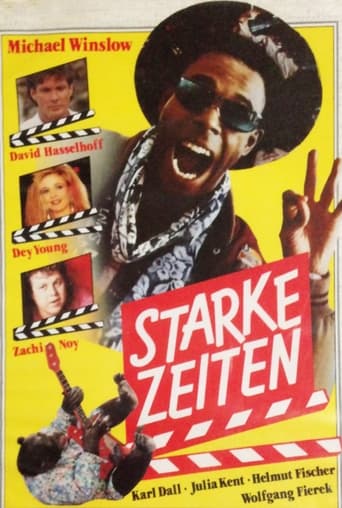

Generalizing, the German comedies of the 1980's were hotchpotches that borrowed as much from the light, harmless 50's musical-comedies as they did from everything that was trendy, fashionable and hyped by the entertainment and fashion industries. Think of US-trash comedies like "Police Academy" and Italian beat-them-up comedies featuring Bud Spencer and Terrence Hill and then throw in no less than two dozen stars of contemporary TV-programs (even though 90% of those roles would be cameo appearances no longer than three seconds).If you grew up in (West)-Germany in the 1980's, you couldn't get around the "Supernasen" films. These were the times of duo Thomas Gottschalk and Mike Krueger (known as the noses) which were harmless, hip, family-friendly, wholesome and where actors, comedians and media-personas would pretty much play themselves, going so far as to always keep their real first names. The soundtracks were often more important than the (non existent) story lines since they movies where meant to hype potential chart-hits. Plus they would supply a generation of kids with one-liners that would invariably become catchphrases on schoolyards around the republic, much to the chagrin of teachers and parents."Starke Zeiten" (a rough translation would be "cool times") is dived up into six episodes that are loosely tied around the topic of time (or the lack there-of), each playing in the Bavarian capital-city Munich but otherwise unrelated: the first episode ("Crazy Times") features the a sexy, modern woman who ends up winning a hillbilly (played convincingly by Hias, a folk music-original) on the German version of "Go on a Date" (featuring Rudi Carrell as himself). Having to spend a weekend in Gran Canary with the boorish Hias, she would soon discover a soft heart under rough Lederhosen and that things aren't always what they seem.This is followed by the episode "Miserable times": aging, narcissistic and self-wary theatre diva Jennings (Hans-Joachim Kullenkampff) plans to commit suicide after his young mistress drops him via a telephone call. He attempts to obtain poison from the flower salesman Doleschal (iconic Otto Schenk) but Doleschals insensitivity and unobstructed greed in sight of a potential inheritance revives the actors pride and spirits. Vowing to party until he'd jump into the grave with a bottle of champagne in each hand, Jennings chases the seemingly lecherous Doleschal out of his mansion. Considering that this story features two quality actors (Kullenkampff) and comedians (Schenk), this enjoyable farce in the vein of Ephraim Kishon might well be the technical highlight of the movie."Bombing times" gives us a David Hasselhoff in his prime, just off Knight Rider and short off becoming a German cult-icon by singing 'I've been looking for freedom' while the Berlin wall crumbled. He plays pretty much the same character as Michael Knight but here he is David, an American scientist who tries to con a rich oil-sheikh (cock-eyed Karl Dall) and his bizarre entourage into buying pills that turn water into petrol. Featuring one of two stars imported from the United States, this was meant to be the highlight of "Starke Zeiten" but comes across as silly, digging deep into the gag-vault of the last 30 years, the only real redeemable factor being the Boney M hits "Rasputin", "Daddy Cool" and various other ear-catchers from the 'German version of ABBA'.The slapstick-y "Turbulent times" comes across as a pure John Graham comedy which made it from stage to TV: John Candy look-alike Zachy Noy (the Lemon Popsicle films) is rudely awakened by water leaking through the roof. Without intention he ends up under the bed of his beautiful but bumbling neighbour Margit Keissler and her two jealous lovers (played by a young Ottfried Fischer, presumably in his first and final sex scene, and former child star Hansi Kraus).The fifth episode, "Super Times" evolves around aspiring Pop star Dee who tries to promote her career by adopting an African orphan but through a computer error end up with full grown Mike (non other than "Police Academy"-voice box Michael Winslow). Winslow would also appear in the comedies "Think Big" and "Loveable Zanies" Part 1 and 2; since the "Academy" films were such a huge success in Germany, he generally keeps his Larvell Jones-persona, sans the police uniform.Final chapter is "Vexing Times", which follows folk actor Helmut Fischer on his quest to buy his morning newspaper, milk and bread-rolls in his Munich neighbourhood, all the time being pestered by fans who mistake him with his TV-persona 'Monaco Franze' (a cult-series where Fischer plays the flamboyant, arch-Bavarian charmer). This may well be the most entertaining episode since it is based on Fischers real tribulations with fame and fandom in his hometown.Essentially, the movie is as harmless as it is pointless to watch unless you're watching it for names and cameos (many of those stars, like Fischer, Kullenkampff, Hias, Carrell or Hans Brenner have since either passed on or had their career descending) or for pure nostalgic reasons. But be warned: like most of its contemporaries – "Geld oder Leber", "Big Mäc" or "Zwei Nasen tanken Super" – it really hasn't aged very well.
... View More